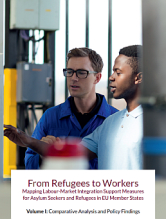Labour Market Integration of Refugees: What Works?
05 December 2016 5:00 pm CET
Iván Martín, Migration Policy Centre, European University Institute, Italy
Venue
wiiw, Rahlgasse 3, 1060 Vienna, lecture hall (ground floor)
Description
Integrating the more than one million refugees who have come to Europe since 2015 is a key challenge for the present social peace and the future economic prosperity of the continent. Rapid labour market integration is crucial in making that integration succeed and in turning the refugee crisis into an economic boost for Europe. However, the OECD has estimated that it takes 20 years for refugees to achieve the same employment rates as native workers. Now, what are EU Member States doing to facilitate that process and shorten the labour market assimilation process for recent refugees? The presentation will review the main findings of a recent study carried out by the Migration Policy Centre of the European University Institute with the support of the Bertelsmann Stiftung. The study, ‘From Refugees to Workers: Mapping Labour Market Integration Support Measures for Refugees and Asylum-Seekers in EU Member States’, is based on nine country case studies (including Austria, carried out by wiiw). It reviews 94 concrete support measures for skills assessment and skills development, economic incentives for integration, job intermediation, recognition of skills and qualifications and ‘integration packages’. It researches how these measures work and the challenges that they face, and what can be learnt from the experience so far. According to the conclusions of the study, despite different social, institutional and labour market contexts across Europe, there is a high degree of comparability, both in terms of the structural challenges faced and in terms of policy responses to them. Some recurrent challenges to the labour market integration of refugees throughout the European Union include: the legal and administrative hurdles making their integration more difficult; the lack of capacity in public employment services and other state institutions for tackling the specific needs of this group; and insufficient coordination among local and national governments, leading to some fragmentation in implemented measures.
Iván Martín is economist and part-time Professor at the Migration Policy Centre of the European University Institute in Florence as well as Visiting Researcher at the Interdisciplinary Research Group on Immigration (GRITIM) of the Universitat Pompeu Fabra in Barcelona. He is Key Expert on Labour Migration in the framework of the External Technical Expertise on Migration to DG DEVCO of the European Commission (ETEM V Project), as well as member of the Expert Group on Economic Migration created by the European Commission. In 2015 and 2016, he carried out two studies for the LIBE Committee of the European Parliament on EU labour migration policy (Exploring New Avenues for Legislation for Labour Migration to the European Union) and the ongoing reform of the EU Blue Card Directive on highly-skilled migration to the European Union. Formerly, he was Senior Research Fellow at the Barcelona Centre for International Affairs-CIDOB (2014), where he was the scientific coordinator of a FP-7 project on Arab Youth; Associate Research Fellow at the Instituto Complutense de Estudios Internacionales in Madrid (2008-2013); Research Administrator at the College of Europe, Natolin Campus, Poland (2010-2011); Director of the Socio-Economic Forum of Casa Árabe (Arab House) and its International Institute for Arab and Muslim World Studies in Spain (2006-2008); and Associate Professor at the Universidad Carlos III de Madrid (2002-2006). Publications: http://eui.academia.edu/IvánMartín
